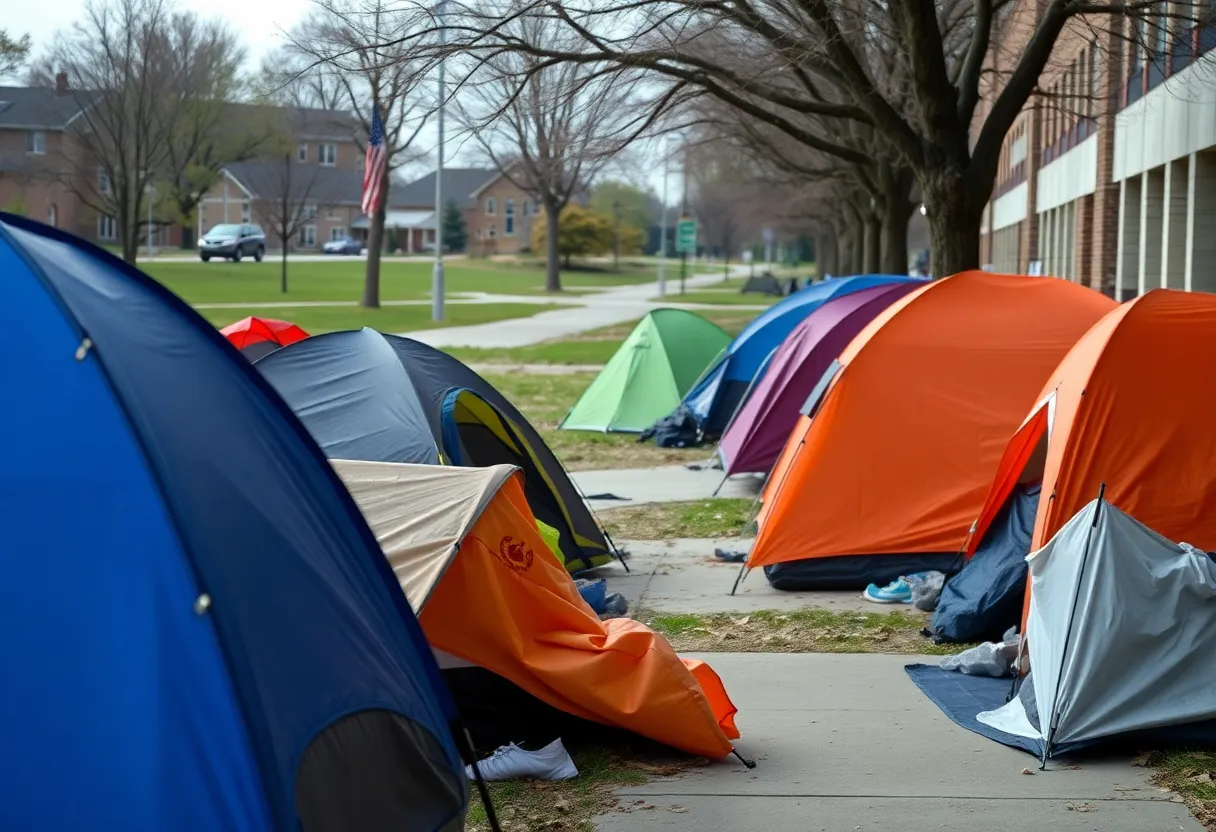Omaha, NE, October 22, 2025
The Omaha City Council voted narrowly against a proposed ordinance intended to regulate homeless encampments on public property. This decision, made after extensive debate, has significant implications for the city’s handling of homelessness, as advocates raised concerns that such regulations would worsen the plight of vulnerable populations. Local shelters are already struggling with capacity issues, and without new policies, city leaders are now exploring alternative approaches to address homelessness, focusing on expanding housing and service programs.
Omaha City Council Rejects Ordinance to Regulate Homeless Encampments
Omaha, NE – The Omaha City Council has voted 5-4 against a proposed ordinance that would have imposed regulations on homeless encampments located on public property. This decision, made after an intense debate, marks a significant moment in the city’s ongoing efforts to address homelessness amid rising humanitarian concerns.
The proposed measure sought to restrict encampments near critical community areas such as schools and parks, aiming to balance public safety with the needs of those experiencing homelessness. However, the ordinance faced strong opposition from advocates who argued it would exacerbate vulnerabilities rather than provide solutions. The narrow defeat highlights the divided opinions within the council and the broader community on how best to tackle the issue.
The council’s session, which lasted over three hours, saw members weighing the potential benefits of regulation against the risks of displacing vulnerable populations. Proponents of the ordinance emphasized the need to protect public spaces, while opponents pointed to the lack of sufficient support services to accommodate those affected. With the vote failing, the status quo remains, leaving encampments unregulated on public lands for now.
Background on the Proposal
The ordinance emerged as part of broader discussions in Omaha about managing the visible impacts of homelessness. City officials had proposed it in response to growing reports of encampments in high-traffic areas, including near educational and recreational facilities. These sites, often set up by individuals and families lacking stable housing, have drawn complaints from residents and businesses concerned about safety and accessibility.
Under the draft rules, encampments would have been prohibited within specified distances from schools and parks, with provisions for relocation assistance. Enforcement would have involved collaboration between city departments, though details on implementation were still being refined. The proposal drew from similar efforts in other cities, where regulations have sometimes led to temporary clearances without long-term housing gains.
Impact on Local Shelters and Services
Local shelters in Omaha are already reporting significant capacity strains, with demand outpacing available beds night after night. Organizations serving the homeless community note that winter months tend to intensify these pressures, as colder weather drives more people to seek indoor refuge. The rejection of the ordinance means no immediate changes to encampment policies, potentially increasing reliance on these overburdened facilities.
In the lead-up to the vote, shelter operators highlighted how previous clearance efforts have overwhelmed their resources, leading to turned-away individuals and heightened health risks. Without new regulations, the city must now prioritize alternative strategies to alleviate these strains, possibly through emergency funding or partnerships with nonprofits.
City Leaders Pivot to Alternative Solutions
Following the vote, city leaders have indicated a shift toward exploring expanded housing programs and other supportive measures. These could include increasing affordable housing stock, enhancing outreach services, and investing in rapid rehousing initiatives. Such approaches aim to address root causes like economic hardship and mental health challenges that contribute to homelessness.
Omaha’s homeless population has seen fluctuations in recent years, influenced by factors such as job market shifts and rising housing costs. Annual point-in-time counts, conducted by the U.S. Department of Housing and Urban Development, have shown a steady need for more permanent solutions. The council’s decision opens the door for collaborative efforts involving state and federal resources to scale up these programs.
Community Response and Next Steps
The debate over the ordinance reflected deeper community divides, with input from residents, advocacy groups, and service providers shaping the discussion. While some welcomed the rejection as a humane step forward, others expressed frustration over the lack of clear guidelines for public space management. Moving ahead, the city plans to hold public forums to gather further feedback and refine its homelessness strategy.
In the interim, outreach teams will continue monitoring encampments to ensure safety and connect individuals with available resources. This approach underscores a commitment to compassionate, comprehensive responses rather than punitive measures. As Omaha navigates these challenges, the focus remains on building sustainable pathways out of homelessness for all affected residents.
The council’s action comes at a pivotal time, as national trends show increasing urban encampments amid a housing crisis. By rejecting the ordinance, Omaha joins a growing number of cities reevaluating enforcement-focused policies in favor of holistic support systems. This decision could influence future legislative efforts, setting a precedent for prioritizing housing over restrictions.
(Word count: 612)
FAQ
What was the outcome of the Omaha City Council vote on the homeless encampment ordinance?
What did the proposed ordinance aim to do?
How long did the council debate the issue?
What challenges are local shelters facing?
What are city leaders planning next?
Key Features of the Omaha Homeless Encampment Ordinance Debate
| Feature | Description |
|---|---|
| Vote Outcome | Omaha City Council voted 5-4 against the proposed ordinance. |
| Proposal Scope | Aimed to limit encampments near schools and parks. |
| Opposition Basis | Backlash from advocates citing humanitarian concerns. |
| Debate Duration | Over three hours of discussion. |
| Shelter Impact | Local shelters report increased capacity strains. |
| Future Plans | City leaders seek alternative solutions like expanded housing programs. |


